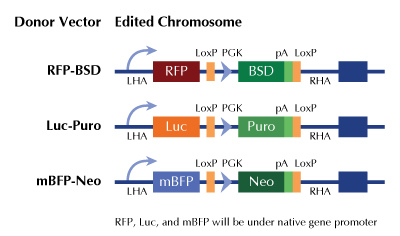Prolactin Receptor (PRLR) Human Gene Knockout Kit (CRISPR)
CAT#: KN209266LP
PRLR - human gene knockout kit via CRISPR, HDR mediated
Functional Cassette: GFP-puro RFP-BSD mBFP-Neo
HDR-mediated knockout kit validation
USD 1,657.00
4 Weeks*
Specifications
| Product Data | |
| Format | 2 gRNA vectors, 1 Luciferase-Puro donor, 1 scramble control |
| Donor DNA | Luciferase-Puro |
| Symbol | Prolactin Receptor |
| Locus ID | 5618 |
| Components |
KN209266G1, Prolactin Receptor gRNA vector 1 in pCas-Guide CRISPR vector KN209266G2, Prolactin Receptor gRNA vector 2 in pCas-Guide CRISPR vector KN209266LPD, donor DNA containing left and right homologous arms and Luciferase-Puro functional cassette. GE100003, scramble sequence in pCas-Guide vector |
| Disclaimer | These products are manufactured and supplied by OriGene under license from ERS. The kit is designed based on the best knowledge of CRISPR technology. The system has been functionally validated for knocking-in the cassette downstream the native promoter. The efficiency of the knock-out varies due to the nature of the biology and the complexity of the experimental process. |
| Reference Data | |
| RefSeq | NM_000949, NM_001204314, NM_001204315, NM_001204316, NM_001204317, NM_001204318, NR_037910 |
| UniProt ID | P16471 |
| Synonyms | HPRL; hPRLrI; MFAB |
| Summary | This gene encodes a receptor for the anterior pituitary hormone, prolactin, and belongs to the type I cytokine receptor family. Prolactin-dependent signaling occurs as the result of ligand-induced dimerization of the prolactin receptor. Several alternatively spliced transcript variants encoding different membrane-bound and soluble isoforms have been described for this gene, which may function to modulate the endocrine and autocrine effects of prolactin in normal tissue and cancer. [provided by RefSeq, Feb 2011] |
Documents
| Product Manuals |
| FAQs |
| SDS |
Resources
Other Versions
| SKU | Description | Size | Price |
|---|---|---|---|
| KN209266 | PRLR - human gene knockout kit via CRISPR, HDR mediated |
USD 1,657.00 |
|
| KN209266BN | PRLR - human gene knockout kit via CRISPR, HDR mediated |
USD 1,657.00 |
|
| KN209266RB | PRLR - human gene knockout kit via CRISPR, HDR mediated |
USD 1,657.00 |
|
| KN409266 | PRLR - KN2.0, Human gene knockout kit via CRISPR, non-homology mediated. |
USD 1,657.00 |
|
| GA103805 | PRLR CRISPRa kit - CRISPR gene activation of human prolactin receptor |
USD 1,657.00 |
{0} Product Review(s)
Be the first one to submit a review






























































































































































































































































 Germany
Germany
 Japan
Japan
 United Kingdom
United Kingdom
 China
China
